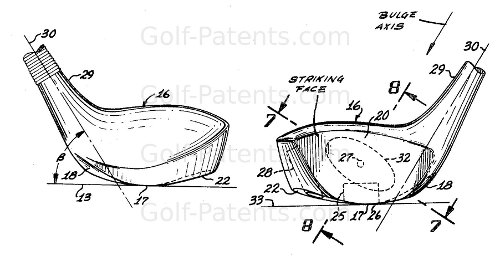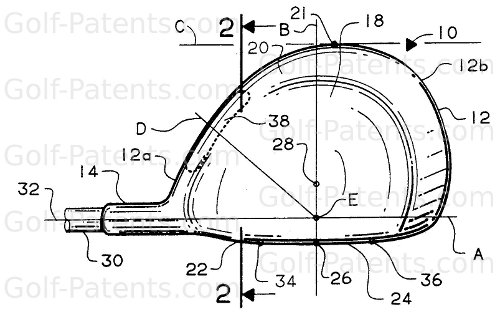Day 5 - Karsten's Patents Directed to Woods
So far this week we have looked at Karsten's non-golf related patents, golf tool related patents, a golf ball patent, and his golf grip patents, therefore it is about time that we start looking at his golf club patents. Let's start with woods.
I was surprised to learn that Karsten is listed as an inventor on only two wood-related patents, however we all know that the PING brand made its name with putters and irons. Karsten's first wood related patent is USPN 3625518 titled "Golf Club Head with Complex Curvature for the Sole and/or the Striking Face." The patent, which issued in 1971, describes the invention as:
Interesting patent, especially the bold portion above about toe weighting. Definitely not something you see much today.
Karsten's only other wood-related patent issued in 1994 as USPN 5310186 titled "Golf Club Head with Weight Pad." The '186 patent is directed to a metal wood design with heel weighting and describes the invention as:
Stay tuned, the best is yet to come with upcoming posts covering Karsten Solheim’s inventions directed to irons and putters.
Dave Dawsey - The IP Golf Guy
I was surprised to learn that Karsten is listed as an inventor on only two wood-related patents, however we all know that the PING brand made its name with putters and irons. Karsten's first wood related patent is USPN 3625518 titled "Golf Club Head with Complex Curvature for the Sole and/or the Striking Face." The patent, which issued in 1971, describes the invention as:
A golf club is provided with a uniquely curved sole for assisting the golfer in keeping the face of the club pointed in a line to the target when, as the ball is addressed, the lie of the club differs from the normal lie. The sole is curved upwardly from the central portion to the heel portion and further curved upwardly and away, at progressively greater rates, from the front face to the rear face. The sole may also be curved from the central portion to the toe portion and further curved downwardly and away at progressively greater rates, from the front face to the rear face. The face of a wood golf club is also provided with a bulge or convex curvature about an axis in a first plane parallel to a plane tangent to the center of the club face and lying in a second plane parallel to the club shaft and passing through a line between the center of the club face and the target at the time of addressing the ball, and a roll or convex curvature about an axis perpendicular to the bulge axis curvature. The radius of curvature for roll is less than for bulge. The rear of the wooden head is extended and tapered, and concentrated weights are placed as much in the toe and the extended rear portion of head as possible.
Karsten's only other wood-related patent issued in 1994 as USPN 5310186 titled "Golf Club Head with Weight Pad." The '186 patent is directed to a metal wood design with heel weighting and describes the invention as:
A golf club head made of a suitable metal such as stainless steel includes a hollow body and a hosel. The hollow body has a top wall, a bottom wall, a side wall, and a front wall with a face arranged for impacting golf balls. The hollow body has a weight pad which provides the golf club head with increased resistance to rotation or twisting upon impact with golf balls at off-center points on the face. The weight pad weighs between 5 and 15 grams and is located in the heel portion of the body. The weight pad is elongated in a direction extending along a length dimension of the body side wall.
Stay tuned, the best is yet to come with upcoming posts covering Karsten Solheim’s inventions directed to irons and putters.
Dave Dawsey - The IP Golf Guy



Comments